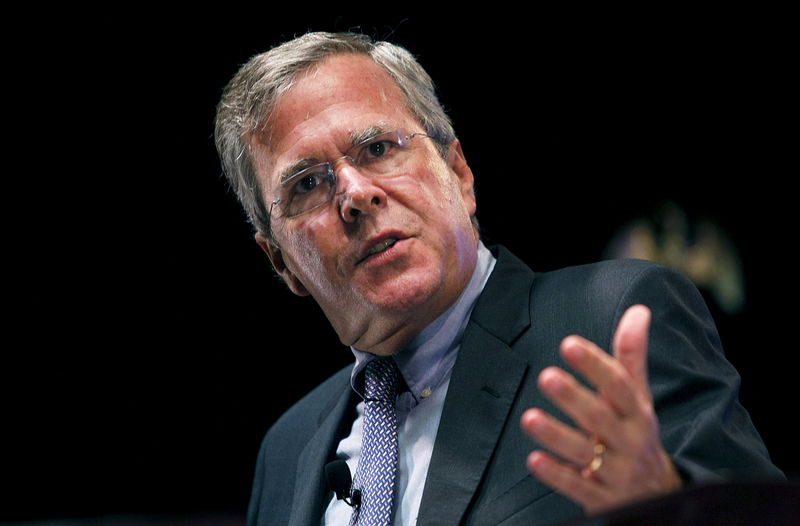By Steve Holland
WASHINGTON (Reuters) - Republican presidential candidate Jeb Bush on Tuesday attacked Democrat Hillary Clinton for her handling of Iraq as secretary of state, saying she must share the blame for the rise of Islamic State militants, in a prelude to a potential general election matchup in 2016.
Iraq is a tricky topic for Bush, given the dismay many Americans still feel over the rationale for the U.S.-led invasion of Iraq ordered by his brother, former President George W. Bush, in 2003.
Mindful of those concerns, Jeb Bush used the bulk of a speech at the Ronald Reagan presidential library not to dwell on the past but to sketch out a future path for the United States in the region that is more muscular than what he called President Barack Obama's "minimalist approach of incremental escalation."
He said he would deploy some U.S. forces in Iraq as forward "spotters" to help identify enemy targets, a step President Barack Obama has resisted out of concern that it could deepen American involvement in Iraq and Syria.
Bush said he would be willing to consider a small increase in U.S. troops beyond those already there and embed some U.S. forces with Iraqi units as Canadian forces are doing.
"Right now, we have around 3,500 soldiers and marines in Iraq, and more may well be needed. We do not need, and our friends do not ask for, a major commitment of American combat forces," he said.
He would provide more support to anti-Islamic State Kurds, and work with regional allies to declare a no-fly zone in Syria to counter Syrian President Hafez al-Assad's forces and Iranian influence.
Bush's criticism of Clinton's role in the events leading up to the 2011 withdrawal of U.S. forces is in line with what other Republicans have contended, that for all her travels around the world as Obama's first-term secretary of state from 2009 to 2013, she showed a disdain for going to Iraq.
"In all her record-setting travels, she stopped by Iraq exactly once," Bush said.
The attack comes after weeks in which the Republican race has been dominated by Donald Trump's antics and taken the spotlight away from the serious policy issues debated by Bush and his rivals for the Republican presidential nomination.
Bush is attempting to pierce what the Clinton camp feels is a major selling point for her candidacy for the Democratic nomination, that she is a foreign policy heavyweight. In doing so, he seeks to present himself to Republican voters as a sturdy opponent for Clinton in 2016.
Bush said a President Bush-ordered U.S. troop surge in 2007 brought stability that would have been extended if Obama had negotiated a U.S. residual force for Iraq. The Obama administration was unable to negotiate a deal with then-Iraqi Prime Minister Nuri al-Maliki and the last troops were brought home in 2011.
"Where was Secretary of State Clinton in all of this? Like the president himself, she had opposed the surge, then joined in claiming credit for its success, then stood by as that hard-won victory by American and allied forces was thrown away," Bush said.
In response, the Clinton campaign held a conference call for reporters with her foreign policy adviser, Jake Sullivan.
Sullivan defended Clinton, saying she had accomplished a successful transition from a U.S. military footprint in Iraq to a civilian one.
"The key issue is not how many times does the plane touch down at the airport. It's how intensive and effective is the engagement that leads to progress," Sullivan said.

He said Jeb Bush was attempting to "rewrite history," and that George W. Bush had set the 2011 date for a U.S. withdrawal.